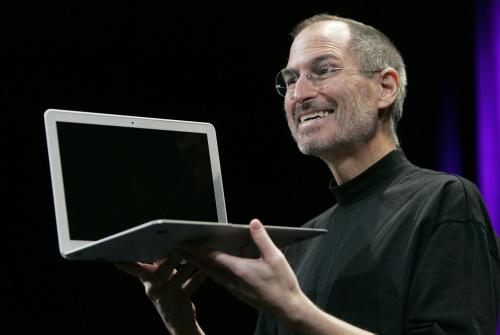By the mid-1990s Jobs was finding some pleasure in his new family life and his astonishing triumph in the movie business,
到20世紀90年代中期,喬布斯在他新的家庭生活和在電影產業的驚人成功中找到了一些快樂,
but he despaired about the personal computer industry.
但是卻對個人計算機產業備感失望。
"Innovation has virtually ceased," he told Gary Wolf of Wired at the end of 1995.
“創新實際上已經停止,”1995年底他對《連線》雜志的加里·沃爾夫這樣說,
"Microsoft dominates with very little innovation. Apple lost. The desktop market has entered the dark ages."
“微軟占據了市場,但幾乎沒有創新。蘋果輸了。臺式電腦市場進入了黑暗時代。”
He was also gloomy in an interview with Tony Perkins and the editors of Red Herring.
同一時期,他在接受安東尼·帕金斯和《紅鯡魚》雜志幾位編輯采訪時,也表現得陰郁沮喪。
First, he displayed the "Bad Steve" side of his personality.
一上來,他就展示出人格中“壞脾氣史蒂夫”的那一面。

Soon after Perkins and his colleagues arrived, Jobs slipped out the back door "for a walk," and he didn't return for forty-five minutes.
帕金斯和他的同事們剛到達不久,喬布斯就從后門溜出去“散步”,45分鐘都沒有回來。
When the magazine's photographer began taking pictures, he snapped at her sarcastically and made her stop.
當雜志的攝影師開始拍照時,他又嚷嚷著諷刺挖苦,迫使她停下來。
Perkins later noted, "Manipulation, selfishness, or downright rudeness, we couldn't figure out the motivation behind his madness."
帕金斯后來寫道:“操縱欲、自私、毫不掩飾的粗魯,我們搞不明白他這些瘋狂舉動背后的動機是什么。”
When he finally settled down for the interview, he said that even the advent of the web would do little to stop Microsoft's domination.
等他終于坐下來接受采訪時,他說,即使是網絡的發展也難以阻擋微軟的主導地位。
"Windows has won," he said. "It beat the Mac, unfortunately, it beat UNIX, it beat OS/2. An inferior product won."
“Windows贏了,”他說,“很不幸,它打敗了Mac,打敗了Unix, 打敗了OS/2。一個低劣產品勝出了。”












